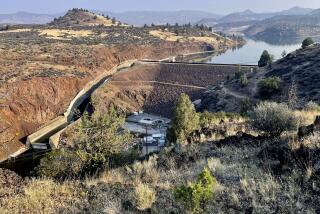State Deal With Hearst Over Coastal Land Closes
- Share via
The state Friday closed a $95-million deal that preserves a scenic stretch of California’s Central Coast and permanently bars development on much of the historic Hearst Ranch.
“The dramatic nature of this agreement is exceeded only by the vision for the state’s future and the value for the people that it will provide,” Gov. Arnold Schwarzenegger said in a statement announcing the closing of escrow. “This magnificent property will forever be preserved.”
The closing finalizes a conservation agreement under which Hearst Corp. is turning over a 13-mile strip of shoreline west of California Highway 1 to the state for use as parkland. The company is also permanently giving up rights to develop most of the ranch’s 80,000 acres of rolling rangeland east of the highway.
In return, the media corporation run by the heirs of newspaper magnate William Randolph Hearst is getting $80 million in cash from the state and $15 million in state tax credits. The company also keeps several development rights, including the ability to build a 100-room hotel at San Simeon Point.
The deal ends years of negotiations and decades of controversy over the fate of the Hearst holdings, one of the biggest undeveloped pieces of private land along the California coast.
Hearst drew up plans in the 1960s to develop what would have been a town of 65,000, but never pursued them. In the 1990s, the company floated a proposal, ultimately quashed by the California Coastal Commission, to build a resort that would have included a golf course, 650-room hotel and dude ranch. The company also unearthed 19th century subdivision plots that it said would have allowed it to build hundreds of homes on the ranch’s oak-studded grasslands, which stretch from the ocean into the Santa Lucia Mountains.
In addition to the hotel development, the deal allows Hearst to keep five of the 18 miles of shoreline it owned. The corporation can also build 27 homes in the ranch’s canyons, out of view of the highway and Hearst Castle, where William Randolph Hearst entertained early Hollywood stars before his palatial home was given to the state.
“With this agreement, we have demonstrated what can be done when people are committed to the land and the resources here at the ranch,” said Stephen T. Hearst, a great-grandson of William Randolph and vice president and general manager of the branch of the company that manages its real estate.
The deal has not been without controversy. Some conservationists have argued that it doesn’t guarantee enough public access and lacks safeguards to ensure protection of the ranch’s rare plants and wildlife.
“We’re grateful in some ways that the massive development proposed over the years is not going to happen and sorry it couldn’t have been a better deal for the public,” said Carl Zichella, state staff director for the Sierra Club. “We signed off on a huge deal without committing [Hearst to] what they need to do to conserve the natural resources of that property.”
More to Read
Inside the business of entertainment
The Wide Shot brings you news, analysis and insights on everything from streaming wars to production — and what it all means for the future.
You may occasionally receive promotional content from the Los Angeles Times.











